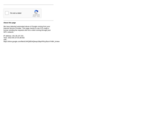
A book covering the start of Western Philosophy and the Ancient World.
- Subject:
- Arts and Humanities
- Philosophy
- Material Type:
- Textbook
- Author:
- Dr. Noah Levin
- Date Added:
- 06/21/2022
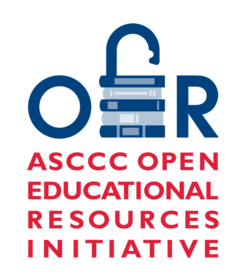
Covers the following course IDs:
As well as resources that do not currently correspond to an existing C-ID but that have been identified by ASCCC staff as noteworthy.

A book covering the start of Western Philosophy and the Ancient World.

It may seem strange to begin a logic textbook with this question. ‘Thinking’ is perhaps the most intimate and personal thing that people do. Yet the more you ‘think’ about thinking, the more mysterious it can appear. Do our thoughts appear in our minds because of the electro-chemical workings of our brains? Or do thoughts come from something that can’t be described by science, such as a soul? Are there deeper levels to the scientific explanation of thinking, for instance involving sub-atomic quantum effects? Or do our thoughts come from pure magic? Does it fit the case to say that our thoughts ‘come from’ some place? Or that they ‘appear’ in our minds? Are the workings of the mind very different from the workings of the heart? Or are emotions and feelings only another kind of thinking? Might the same be said of intuitions, or inspirations, or dreams?
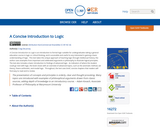
A Concise Introduction to Logic is an introduction to formal logic suitable for undergraduates taking a general education course in logic or critical thinking, and is accessible and useful to any interested in gaining a basic understanding of logic. This text takes the unique approach of teaching logic through intellectual history; the author uses examples from important and celebrated arguments in philosophy to illustrate logical principles. The text also includes a basic introduction to findings of advanced logic. As indicators of where the student could go next with logic, the book closes with an overview of advanced topics, such as the axiomatic method, set theory, Peano arithmetic, and modal logic. Throughout, the text uses brief, concise chapters that readers will find easy to read and to review.
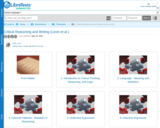
What is thinking? It may seem strange to begin a logic textbook with this question. ‘Thinking’ is perhaps the most intimate and personal thing that people do. Yet the more you ‘think’ about thinking, the more mysterious it can appear. It is the sort of thing that one intuitively or naturally understands, and yet cannot describe to others without great difficulty. Many people believe that logic is very abstract, dispassionate, complicated, and even cold. But in fact the study of logic is nothing more intimidating or obscure than this: the study of good thinking.
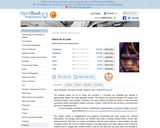
What does pleasure have to do with morality? What role, if any, should intuition have in the formation of moral theory? If something is ‘simulated', can it be immoral?
This accessible and wide-ranging textbook explores these questions and many more. Key ideas in the fields of normative ethics, metaethics and applied ethics are explained rigorously and systematically, with a vivid writing style that enlivens the topics with energy and wit. Individual theories are discussed in detail in the first part of the book, before these positions are applied to a wide range of contemporary situations including business ethics, sexual ethics, and the acceptability of eating animals. A wealth of real-life examples, set out with depth and care, illuminate the complexities of different ethical approaches while conveying their modern-day relevance.
This concise and highly engaging resource is tailored to the Ethics components of AQA Philosophy and OCR Religious Studies, with a clear and practical layout that includes end-of-chapter summaries, key terms, and common mistakes to avoid. It should also be of practical use for those teaching Philosophy as part of the International Baccalaureate.
Ethics for A-Level is of particular value to students and teachers, but Fisher and Dimmock's precise and scholarly approach will appeal to anyone seeking a rigorous and lively introduction to the challenging subject of ethics.
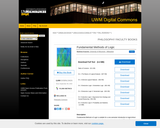
Fundamental Methods of Logic is suitable for a one-semester introduction to logic/critical reasoning course. It covers a variety of topics at an introductory level. Chapter One introduces basic notions, such as arguments and explanations, validity and soundness, deductive and inductive reasoning; it also covers basic analytical techniques, such as distinguishing premises from conclusions and diagramming arguments. Chapter Two discusses informal logical fallacies. Chapters Three and Four concern deductive logic, introducing the basics of Aristotelian and Sentential Logic, respectively. Chapter Five deals with analogical and causal reasoning, including a discussion of Mill's Methods. Chapter Six covers basic probability calculations, Bayesian inference, fundamental statistical concepts and techniques, and common statistical fallacies.
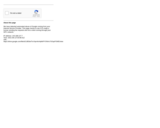
An Introduction to Ethics Open Resource
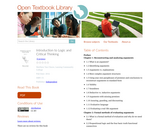
This is an introductory textbook in logic and critical thinking. The goal of the textbook is to provide the reader with a set of tools and skills that will enable them to identify and evaluate arguments. The book is intended for an introductory course that covers both formal and informal logic. As such, it is not a formal logic textbook, but is closer to what one would find marketed as a critical thinking textbook. Downloadable as a pdf file.
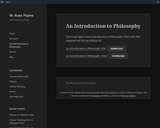
The goal of this text is to present philosophy to newcomers as a living discipline with historical roots. While a few early chapters are historically organized, the goal in the historical chapters is to trace a developmental progression of thought that introduces basic philosophical methods and frames issues that remain relevant today. Later chapters are topically organized. These include philosophy of science and philosophy of mind, areas where philosophy has shown dramatic recent progress. This text concludes with four chapters on ethics, broadly construed. Traditional theories of right action is covered in a third of these. Students are first invited first to think about what is good for themselves and their relationships in a chapter of love and happiness. Next a few meta-ethical issues are considered; namely, whether they are moral truths and if so what makes them so. The end of the ethics sequence addresses social justice, what it is for one's community to be good. Our sphere of concern expands progressively through these chapters. Our inquiry recapitulates the course of development into moral maturity. Over the course of the text, the author has tried to outline the continuity of thought that leads from the historical roots of philosophy to a few of the diverse areas of inquiry that continue to make significant contributions to our understanding of ourselves and the world we live in.
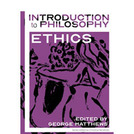
We often make judgments about good and bad, right and wrong. Philosophical ethics is the critical examination of these and other concepts central to how we evaluate our own and each others’ behavior and choices.
This text examines some of the main threads of discussion on these topics that have developed over the last couple of millenia, mostly within the Western cultural tradition. It considers basic questions about moral and ethical judgment: Is there such a thing as something that is really right or really wrong independent of time, place and perspective? What is the relationship between religion and ethics? How can we reconcile self-interest and ethics? Is it ever acceptable to harm one person in order to help others? What do recent discussions in evolutionary biology or have to say about human moral systems? What is the relation between gender and ethics? The authors invite you to participate in their exploration of these and many other questions in philosophical ethics.
If you are adopting or adapting this book for a course, please let us know on our adoption form for the Introduction to Philosophy open textbook series: https://docs.google.com/forms/d/e/1FAIpQLSdwf2E7bRGvWefjhNZ07kgpgnNFxVxxp-iidPE5gfDBQNGBGg/viewform?usp=sf_link.
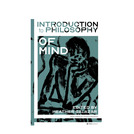
Introduction to Philosophy: Philosophy of Mind (edited by Heather Salazar) surveys the central themes in philosophy of mind and places them in a historical and contemporary context intended to engage first-time readers in the field. It focuses on debates about the status and character of the mind and its seemingly subjective nature in an apparently more objective world.
Written by experts and emerging researchers in their subject areas, each chapter brings clarity to complex material and involves the reader through a wealth of examples. Many chapters include applications of the concepts to film and literature that will stimulate readers to firmly grasp the significance of the philosophy of mind. Subjects covered are how the mind fits into the material world and how to analyze its properties. In that vein, substance dualism, materialism, behaviorism, functionalism, and property dualism are all explored.
In addition, it includes insightful contributions on how to explain seemingly subjective feelings, the mystery of consciousness, conceptual understanding of the world outside of the mind, and free will. The book is designed to be used alone or alongside a reader of historical and contemporary original sources.
If you are adopting or adapting this book for a course, please let us know on our adoption form for the Introduction to Philosophy open textbook series: https://docs.google.com/forms/d/e/1FAIpQLSdwf2E7bRGvWefjhNZ07kgpgnNFxVxxp-iidPE5gfDBQNGBGg/viewform?usp=sf_link.
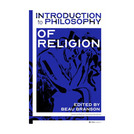
Introduction to Philosophy: Philosophy of Religion introduces some of the major traditional arguments for and against the existence of God, as well as some less well-known, but thought-provoking arguments for the existence of God, and one of the most important new challenges to religious belief from the Cognitive Science of Religion. An introductory chapter traces the connection between philosophy and religion throughout Western history, and a final chapter addresses the place of non-Western and non-monotheistic religions within contemporary philosophy of religion.
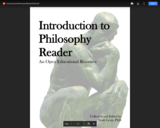
Philosophy (from Greek φιλοσοφία, philosophia, literally "love of wisdom") is the study of general and fundamental problems concerning matters such as existence, knowledge, values, reason, mind, and language. The term was probably coined by Pythagoras (c. 570 – c. 495 BC). Philosophical methods include questioning, critical discussion, rational argument and systematic presentation. Classic philosophical questions include: Is it possible to know anything and to prove it? What is most real? However, philosophers might also pose more practical and concrete questions such as: Is there a best way to live? Is it better to be just or unjust (if one can get away with it)? Do humans have free will?

Microwave and RF Design: Modules focuses on the design of systems based on microwave modules. The use of modules has become increasingly important in RF and microwave engineering for rapidly realizing high performance microwave systems. When integration is ultimately to be used, building a system up using modules provides a rapid means of prototyping and testing system concepts. A wide variety of RF modules including amplifiers, local oscillators, switches, circulators, isolators, phase detectors, frequency multipliers and dividers, phase-locked loops, and direct digital synthesizers are considered. Detailed design strategies for synthesizing filters based on parallel coupled lines are presented. The reader will gain an appreciation of design by synthesis. This book is suitable as both an undergraduate and graduate textbook, as well as a career-long reference book.
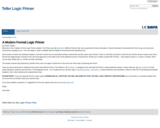
Welcome to the A Modern Formal Logic Primer website. The Primer was published in 1989 by Prentice Hall, since acquired by Pearson Education. Pearson Education has allowed the Primer to go out of print and returned the copyright to the author. It is now available without charge for instructional and educational use.
Each volume is broken into individual chapters. And each volume has an associated solutions manual (the last item under each volume). There is a file with corrections to both the text and the answer manual. Also note a file with the diagrammatic summary of the rules that appeared on the inside cover of the published version of the primmer. All files are in Adobe Acrobat PDF 6 format. – they require version 6, or newer, of Adobe, which can be down loaded here. All files are fully searchable.
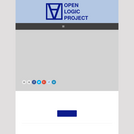
The Open Logic Text is an open textbook on mathematical logic aimed at a non-mathematical audience, intended for advanced logic courses as taught in many philosophy departments. It is open-source: you can download the LaTeX code. It is open: you’re free to change it whichever way you like, and share your changes. It is collaborative: a team of people is working on it, using the GitHub platform, and we welcome contributions and feedback. And it is written with configurability in mind.
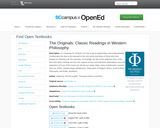
It is important for students not only to get an appreciation and understanding of philosophy but also to be exposed to the very words and ideas of those who have shaped our thinking over the centuries. Accordingly, the title of this collection hints at the facts that these readings are from the original sources and that these philosophers were the originators of many of the issues we still discuss today. Major areas of philosophy covered here are: Ethics, Epistemology, Metaphysics, Philosophy of Religion, Ethics, Socio-Political Philosophy, and finally, Aesthetics.
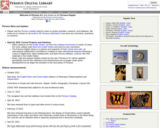
Perseus is an evolving digital library, engineering interactions through time, space, and language. Our primary goal is to bring a wide range of source materials to as large an audience as possible. We anticipate that greater accessibility to the sources for the study of the humanities will strengthen the quality of questions, lead to new avenues of research, and connect more people through the connection of ideas.
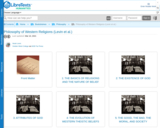
I have organized this textbook around the way I teach my introductory course in the philosophy of religion. Since I got to design this textbook and it’s for use in my own courses, it directly follows the order in which I teach the topics and each chapter makes up the reading assignment for about 1.5 hours of class time. In other words, I meet with students for thirty 1.5-hour sessions in a semester (hence there are 30 chapters in this work), and for the first meeting, we read and discuss chapter 1, for our second we cover chapter 2, then chapter 3, and so on. It leaves the guess work out of what we cover and when we cover it and keeps things very organized and streamlined. I tell you this now to give you some insight into the way I approach my classroom and time with my students. Since this is intended for an intro-level course, keeping things on track, moving, and organized in this way has proved to be very beneficial for my students.
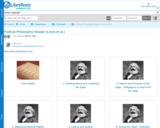
In terms of a political entity, a state is any politically organized community living under a single system
of government. States may or may not be sovereign. For instance, federated states are members of a
federal union, and may have only partial sovereignty, but are, nonetheless, states. Some states are
subject to external sovereignty or hegemony, in which ultimate sovereignty lies in another state. States
that are sovereign are known as sovereign states.